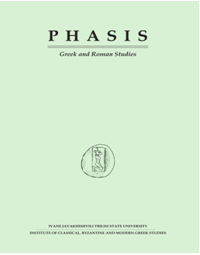Υπερρεαλισμός και αρχαιότητα
DOI:
https://doi.org/10.60131/phasis.17.2014.2329Abstract
Out of diverse literary trends emerging in Europe in the 20th century, surrealism was the only one to become widespread in Greece. Greek surrealist writers frequently employ antiquity-related thems. In this regard, three different types of literary adoption can be distinguished in their works: 1. Nominations: the use of an antiquity-related symbol or name in a particular context; 2. Allusion: passages either implying a reference to ancient motifs or evoking such associations in the reader; 3. Quoting: use of vocabulary from ancient literature, including full sentence quotes without any signals. In an attempt to explore how antiquity relates to surrealism, it can be argued that ancient civilizations stand out in terms if diverse approaches to the subconscious was widely reflected in ancient Greek literature and art. Second, theoretical interest in the subconscious started as early as the ancient period. Thus, what the ancient and first of all, Greek civilizations adopted from other civilizations with respect to the subconscious was subject to both artistic interpretation and theoretical investigation. Along with other circumstances, the popularity of surrealism in Greece is owed to Greek writers' close links with the ancient literary heritage. Thus, heredity accounts for the fact that surrealism, a distinctly cosmopolitan trend, became altogether nationalized in Greece.Downloads
Published
2014-05-17
Issue
Section
Articles
License
Copyright (c) 2014 PHASIS

This work is licensed under a Creative Commons Attribution-NonCommercial 4.0 International License.


